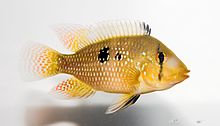Geophagini
| Geophagini | |
|---|---|
 | |
Geophagus brasiliensis | |
Scientific classification | |
| Kingdom: | Animalia |
| Phylum: | Chordata |
| Class: | Actinopterygii |
| Order: | Cichliformes |
| Family: | Cichlidae |
| Subfamily: | Cichlinae |
| Tribe: | Geophagini Haseman, 1911 |
Type genus | |
Geophagus Heckel, 1840 | |
Geophagus is a tribe of cichlids from the subfamily Cichlinae, the American cichlids. It is the sister taxon to the clade which includes the Cichlasomatini and Heroini. Fishes in the Geophagini are distributed from Panama south to Argentina, it is the most speciose of the seven tribes within the Cichlinae and it is subdivided into three sub-tribes, Acarichthyina, Crenicaratina, and Geophagina which together contain over 200 species.[1] Geophagines show morphological and behavioural specialisations to enable them to sift the substrates within their mouths so that they can separate benthic invertebrates from substrates dominated by sand or silt.[2]
Classification
The Geophagini are classified as follows:[1]
- Subtribe Acarichthyina Kullander, 1998
- Genus Acarichthys C. H. Eigenmann, 1912
- Genus Guianacara Kullander & Nijssen, 1989
- Genus Acarichthys C. H. Eigenmann, 1912
- Subtribe Crenicaratina Kullander, 1998
- Genus Biotoecus C. H. Eigenmann & C. H. Kennedy, 1903
- Genus Crenicara Steindachner, 1875
- Genus Crenicichla Heckel, 1840
- Genus Dicrossus Steindachner, 1875
- Genus Teleocichla Kullander, 1988
- Genus Biotoecus C. H. Eigenmann & C. H. Kennedy, 1903
- Subtribe Geophagina Haseman, 1911
- Genus Apistogramma Regan, 1913
- Genus Apistogrammoides Meinken, 1965
- Genus Biotodoma C. H. Eigenmann & C. H. Kennedy, 1903
- Genus Geophagus Heckel, 1840
- Genus Gymnogeophagus Miranda-Ribeiro, 1918
- Genus Mazarunia Kullander, 1990
- Genus Mikrogeophagus Meulengracht-Madsen, 1968
- Genus Satanoperca Günther, 1862
- Genus Taeniacara G. S. Myers, 1935
- Genus Apistogramma Regan, 1913
References
^ ab Wm. Leo Smith; Prosanta Chakrabarty; John S. Sparks (2008). "Phylogeny, taxonomy, and evolution of Neotropical cichlids (Teleostei: Cichlidae: Cichlinae)" (PDF). Cladistics. 24 (5): 624–641..mw-parser-output cite.citation{font-style:inherit}.mw-parser-output .citation q{quotes:"""""""'""'"}.mw-parser-output .citation .cs1-lock-free a{background:url("//upload.wikimedia.org/wikipedia/commons/thumb/6/65/Lock-green.svg/9px-Lock-green.svg.png")no-repeat;background-position:right .1em center}.mw-parser-output .citation .cs1-lock-limited a,.mw-parser-output .citation .cs1-lock-registration a{background:url("//upload.wikimedia.org/wikipedia/commons/thumb/d/d6/Lock-gray-alt-2.svg/9px-Lock-gray-alt-2.svg.png")no-repeat;background-position:right .1em center}.mw-parser-output .citation .cs1-lock-subscription a{background:url("//upload.wikimedia.org/wikipedia/commons/thumb/a/aa/Lock-red-alt-2.svg/9px-Lock-red-alt-2.svg.png")no-repeat;background-position:right .1em center}.mw-parser-output .cs1-subscription,.mw-parser-output .cs1-registration{color:#555}.mw-parser-output .cs1-subscription span,.mw-parser-output .cs1-registration span{border-bottom:1px dotted;cursor:help}.mw-parser-output .cs1-ws-icon a{background:url("//upload.wikimedia.org/wikipedia/commons/thumb/4/4c/Wikisource-logo.svg/12px-Wikisource-logo.svg.png")no-repeat;background-position:right .1em center}.mw-parser-output code.cs1-code{color:inherit;background:inherit;border:inherit;padding:inherit}.mw-parser-output .cs1-hidden-error{display:none;font-size:100%}.mw-parser-output .cs1-visible-error{font-size:100%}.mw-parser-output .cs1-maint{display:none;color:#33aa33;margin-left:0.3em}.mw-parser-output .cs1-subscription,.mw-parser-output .cs1-registration,.mw-parser-output .cs1-format{font-size:95%}.mw-parser-output .cs1-kern-left,.mw-parser-output .cs1-kern-wl-left{padding-left:0.2em}.mw-parser-output .cs1-kern-right,.mw-parser-output .cs1-kern-wl-right{padding-right:0.2em}
^ Hernán López‐Fernández; Jessica H. Arbour; Kirk. O. Winemiller; Rodney L. Honeycutt (2012). "Testing for Ancient Adaptive Radiations in Neotropical Cichlid Fishes". Evolution. 67 (5): 1321–1337. doi:10.1111/evo.12038. PMID 23617911.